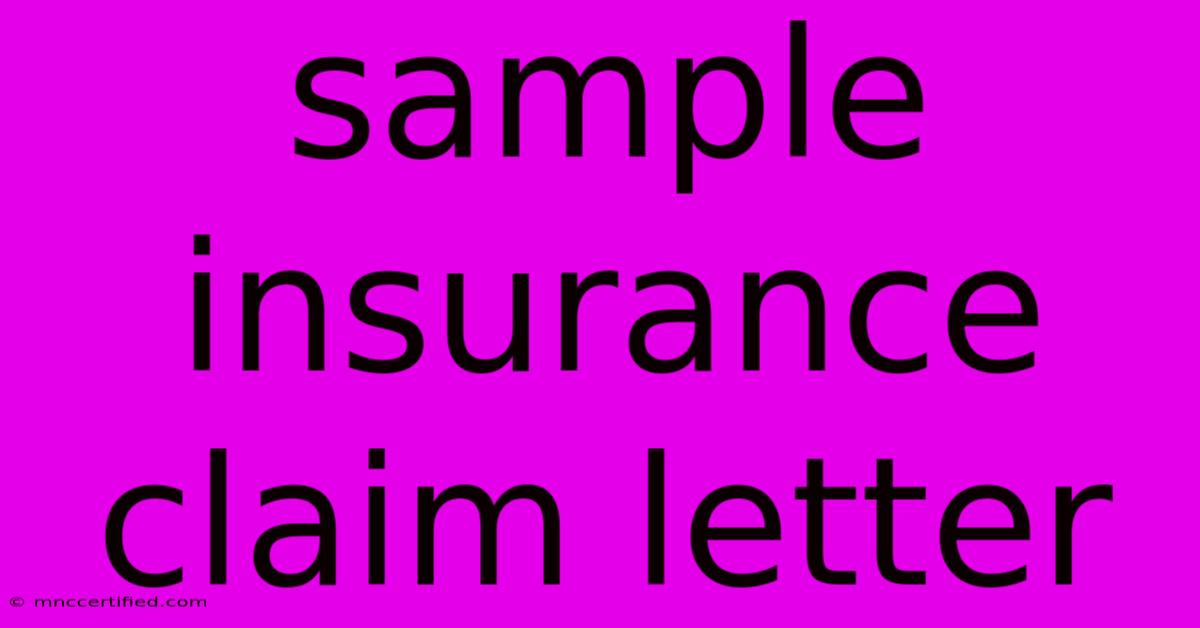Sample Insurance Claim Letter

Table of Contents
Sample Insurance Claim Letter: A Comprehensive Guide
Filing an insurance claim can be stressful, but a well-written letter significantly improves your chances of a smooth and successful process. This guide provides sample insurance claim letters for various situations, along with expert tips to help you craft your own compelling and effective claim. We'll cover everything from understanding the necessary information to including persuasive details and following up effectively.
Understanding the Importance of a Well-Written Claim Letter
Your insurance claim letter is your first formal communication with your insurance company regarding a loss or damage. A poorly written or incomplete letter can lead to delays, denials, or even the complete rejection of your claim. A clear, concise, and well-organized letter, however, demonstrates professionalism and significantly increases your chances of a quick and fair settlement. Think of it as your first impression – make it count!
Sample Insurance Claim Letters: Different Scenarios
Below are examples of insurance claim letters for different situations. Remember to adapt these templates to your specific circumstances, replacing bracketed information with your details.
Sample 1: Auto Insurance Claim Letter (Accident)
[Your Name] [Your Address] [Your Phone Number] [Your Email Address]
[Date]
[Insurance Company Name] [Insurance Company Address]
Subject: Auto Insurance Claim – Accident on [Date of Accident]
Dear [Claims Adjuster Name],
This letter is to formally file a claim for an auto accident that occurred on [Date of Accident] at approximately [Time of Accident] at [Location of Accident]. My vehicle, a [Year] [Make] [Model], [Vehicle Identification Number (VIN)], was involved in a collision with [Other Driver's Information, if applicable].
[Clearly describe the accident, including details like weather conditions, who was at fault, and witness information]. I have attached copies of the following documents:
- Police report (if applicable)
- Photos of vehicle damage
- [Any other relevant documents, e.g., medical bills, repair estimates]
The estimated cost of repairs is [Amount]. I request that you initiate the claims process and reimburse me for the damages incurred.
Sincerely, [Your Signature] [Your Typed Name]
Sample 2: Home Insurance Claim Letter (Damage)
[Your Name] [Your Address] [Your Phone Number] [Your Email Address]
[Date]
[Insurance Company Name] [Insurance Company Address]
Subject: Home Insurance Claim – Property Damage on [Date of Damage]
Dear [Claims Adjuster Name],
This letter is to formally file a claim for property damage to my home located at [Your Address] that occurred on [Date of Damage] due to [Cause of Damage, e.g., fire, storm, vandalism].
[Describe the damage in detail, including specific areas affected and the estimated cost of repair or replacement]. I have attached the following documentation:
- Photos and videos of the damage
- [Relevant receipts or invoices for damaged items]
- [Estimates from contractors for repairs]
I kindly request that you investigate this matter promptly and provide me with information regarding the claims process.
Sincerely, [Your Signature] [Your Typed Name]
Sample 3: Health Insurance Claim Letter (Medical Expenses)
[Your Name] [Your Address] [Your Phone Number] [Your Email Address]
[Date]
[Insurance Company Name] [Insurance Company Address]
Subject: Health Insurance Claim – [Your Name] – [Date of Service]
Dear [Claims Adjuster Name],
This letter is to formally file a claim for medical expenses incurred on [Date of Service] for [Reason for Service, e.g., doctor's visit, hospitalization]. My policy number is [Your Policy Number]. I have attached copies of the following:
- Explanation of Benefits (EOB) from my provider
- Original medical bills
Please process my claim and reimburse me for the eligible expenses.
Sincerely, [Your Signature] [Your Typed Name]
Key Elements of a Strong Insurance Claim Letter
- Accuracy: Double-check all information for accuracy. Errors can delay the process.
- Clarity and Conciseness: Use clear, simple language and avoid jargon.
- Supporting Documentation: Always include all necessary supporting documents.
- Professional Tone: Maintain a professional and respectful tone throughout the letter.
- Follow-Up: Follow up if you haven't heard back within a reasonable timeframe.
Off-Page SEO Strategies for Increased Visibility
While this article focuses on on-page SEO through keyword optimization and content structuring, remember that off-page SEO is crucial for long-term success. Consider building backlinks to your article from reputable insurance-related websites or blogs. Sharing your article on social media platforms also increases its visibility and reach.
By following these guidelines and using the sample letters as templates, you can significantly increase your chances of a successful insurance claim. Remember to always consult your insurance policy for specific instructions and requirements.

Thank you for visiting our website wich cover about Sample Insurance Claim Letter. We hope the information provided has been useful to you. Feel free to contact us if you have any questions or need further assistance. See you next time and dont miss to bookmark.
Featured Posts
-
Clark Howard Dental Insurance
Nov 29, 2024
-
Giants Lead Cowboys 7 3 Lock Nabers Contribute
Nov 29, 2024
-
Europa League Assessing Rangers Players
Nov 29, 2024
-
X Ray Costs Without Insurance
Nov 29, 2024
-
Drew Lock Starting Week 13 For Giants
Nov 29, 2024